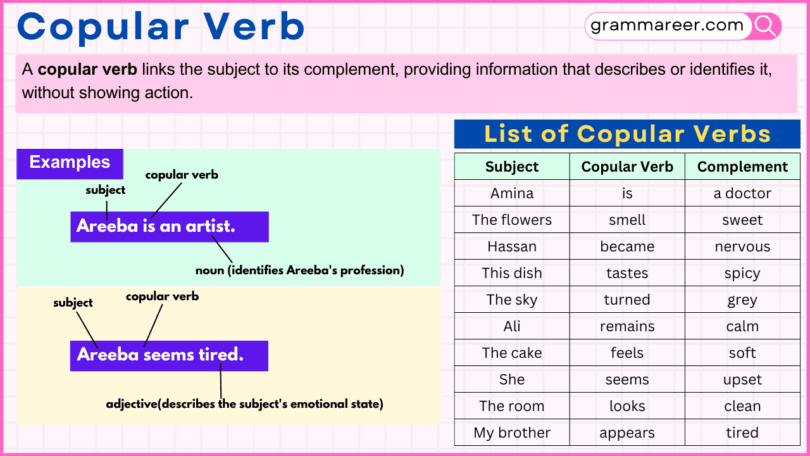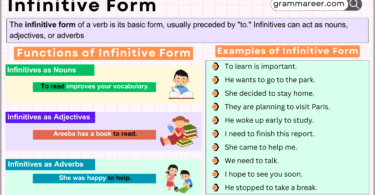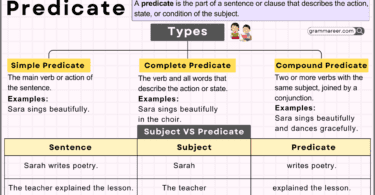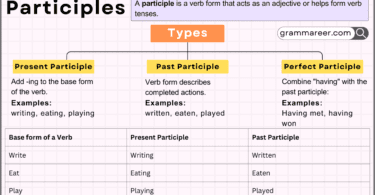Copular verbs are an essential part of English grammar, often overlooked by learners but crucial for constructing meaningful sentences. These verbs link the subject of a sentence to additional information about it, rather than showing an action. They serve as the backbone for many sentences, helping to clarify and define subjects. Mastering copular verbs allows learners to express descriptions, states, and identities with confidence.
A copular verb links the subject to its complement, providing information that describes or identifies it, without showing actin.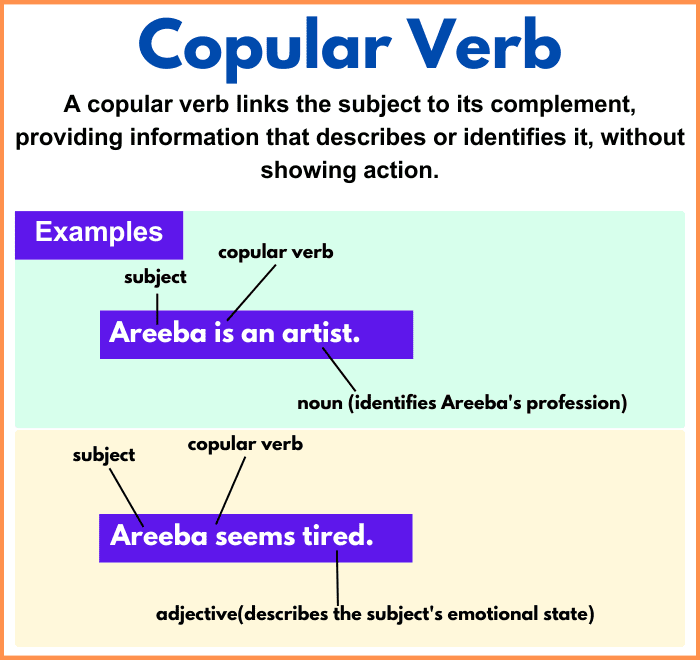
Table of Contents
Copula or Copular?
The terms copula and copular are closely related but serve different grammatical purposes.
- Copula: Refers specifically to the verb itself, such as “is,” “seems,” or “becomes.”
- Copular: Describes the role or function of the verb in linking the subject to its complement.
Examples:
- “Is” in the sentence “Ahmed is happy” is a copula.
- The verb “is” plays a copular role by linking “Ahmed” to “happy.”
Examples of Copular Verbs
Here is a table of sentences demonstrating common copular verbs:
| Subject | Copular Verb | Complement |
|---|---|---|
| Amina | is | a doctor |
| The flowers | smell | sweet |
| Hassan | became | nervous |
| This dish | tastes | spicy |
| The sky | turned | grey |
| Ali | remains | calm |
| The cake | feels | soft |
| She | seems | upset |
| The room | looks | clean |
| My brother | appears | tired |
| The house | stayed | quiet |
| The lake | grew | still |
| Yasir | was | a student |
| Her voice | sounded | cheerful |
| The water | kept | warm |
| Their idea | proved | helpful |
| He | looked | confused |
| This project | ended | successful |
| Zainab | felt | happy |
| That story | sounded | interesting |
In each example, the copular verb connects the subject to a complement that describes or identifies it.
Difference Between Copular and Action Verbs
Understanding the distinction between copular and action verbs is vital:
Copular Verbs:
Link the subject to a complement.
- The soup smells delicious.
Explanation:
The verb “smells” connects “soup” to “delicious.”
Action Verbs:
Describe an action performed by the subject.
- The chef smells the soup.
Explanation:
The verb “smells” indicates an action by “the chef.”
A Copular Verb Links the Subject to a Subject Complement
A subject complement is the word or phrase that follows the copular verb, providing more information about the subject. It can be:
Adjective:
- The weather is cold.
The word “cold” describes the subject “weather.”
Noun:
- Sarah is a writer.
The word “writer” identifies the subject “Sarah.”
Identifying Copular Verbs
To identify a copular verb:
Check if the verb links the subject to additional information.
- The cake tastes amazing.
The verb “tastes” connects “cake” to “amazing.”
Replace the verb with “is” or “are.” If the sentence retains its meaning, it’s likely copular.
- Original: The sky turned orange.
- Test: The sky is orange.
- Result: The meaning remains clear, so “turned” is copular.
Common Errors with Copular Verbs
Learners often confuse copular verbs with action verbs. Here are some common errors:
❌ The cake feels delicious.
✅ The cake tastes delicious.
“Feels” refers to physical touch, not taste.
❌ She seems angrily.
✅ She seems angry.
Copular verbs are followed by adjectives, not adverbs.
Importance of Copular Verbs
Copular verbs are fundamental for:
Expressing States:
- The baby is asleep.
Describing Qualities:
- The fabric feels soft.
Identifying Roles:
- He became a leader.
FAQs
A copular verb links the subject to information about it, while an action verb shows what the subject does.
For example:
The soup is hot (copular).
The chef smells the soup (action).
No, only specific verbs like “is,” “seems,” and “becomes” serve as copular verbs. These verbs connect the subject to a complement, unlike action verbs.
Common copular verbs include “is,” “seems,” “looks,” “feels,” “smells,” “tastes,” “becomes,” and “remains.”
No, a verb in a single clause functions as either copular or action, not both. However, different clauses in a sentence may use both types.
She is tired.
They are teachers.
He was sick.
We were happy.
She became a writer.
The soup tastes good.
The sky looks cloudy.
Conclusion
Mastering copular verbs enables learners to form precise and descriptive sentences. These verbs serve as bridges, connecting subjects to the information that defines or describes them. By practicing examples and avoiding common errors, learners can use copular verbs confidently to express states, qualities, and identities in English.
You May Also Like

